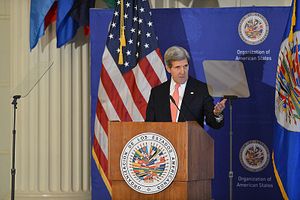The U.S. Department of State’s Quadrennial Diplomacy and Development Review (QDDR) came out earlier this week. The document is an introspective look into the diplomatic apparatus of the world’s foremost superpower and one that allows outsiders to glean, among other things, what keeps the bureaucrats down in Foggy Bottom awake at night. In the State Department’s more anodyne description of the document, the QDDR “provides a blueprint for advancing America’s interests in global security, inclusive economic growth, climate change, accountable governance, and freedom for all.”
This year’s big takeaway, as commentators elsewhere have noted, is that the State Department fears for the longevity and quality of the post-war international system that the United States helped created. This ‘house that Uncle Sam built’ is starting to show its age and irrelevance due to both outdated international governance models (internal factors) and rising powers such as China (external factors). The report triumphantly describes the United States’ post-war achievement:
Seventy years ago, a bipartisan group of visionary Americans forged a system of modern international institutions, as well as economic and security arrangements, aimed at preventing another catastrophic world war and addressing acute human suffering. Sustained by steady, principled American leadership, this system enabled the peaceful end of the Cold War, a wave of democratization, and unprecedented improvement in the basic human condition around the globe.
However, “aspects of that post-World War II system are fraying,” and this is the fundamental problem for the United States going forward in the 21st century. In a way, the QDDR’s presentation of the problem seems a little odd and behind-the-times. Political scientists, popular commentators, and even TV pundits have been discussing the threat to the international order for some years now. The 2008 financial crisis amplified whatever frenzy existed about China’s challenge to the international order, including the Bretton Woods institutions.
Reading the QDDR in April 2015, it’s hard not to think of the United States’ somewhat atypically acerbic reaction to China’s launch of the Asian Infrastructure Investment Bank (AIIB). While the AIIB isn’t nearly ambitious enough as an institution to come even close to offering a replacement for U.S.-led institutions like the World Bank, it has awoken fears that China, the next great power, is looking to offer its own vision of world order. These worries are premature. At best, the AIIB, and other China-backed institutions — including the Shanghai Cooperation Organization, the BRICS Bank, and the Conference on Confidence-Building Measures in Asia (CICA) — offer a supplement to the U.S. order.
Extrapolating on the QDDR, it may be the case that we’ll see the United States’ foreign policy being driven by less of the post-Cold War confidence that defined the 1990s and more with a sense of dread at the uncertainty that lies ahead. Dan Drezner, writing for the Washington Post, highlights fiscal tightening as another factor that will make U.S. diplomacy less nimble and ambitious going forward (and, as Drezner notes, more reliant than ever on “partner” backing).
This is all, of course, good food for thought. While the QDDR reveals the sort of introspection we’d ideally like the United States’ foreign policy bureaucrats to undertake, its long-term effect on U.S. policy remains questionable at best. (The QDDR document is available here in PDF form.)
































